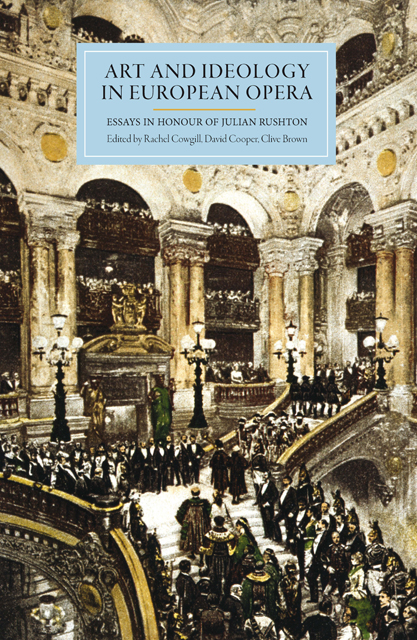Book contents
- Frontmatter
- Contents
- List of Figures
- List of Music Examples
- List of Tables
- Notes on Editors and Contributors
- Acknowledgements
- Introduction
- I Nationalism, Cosmopolitanism and National Opera
- II Opera, Class and the Politics of Enlightenment
- III Opera and Otherness
- Julian Rushton: A Family Memoir
- 7 The Works of Julian Rushton
- Index
- Tabula Gratulatoria
17 - Being-with Grimes: The Problem of Others in Britten’s First Opera
Published online by Cambridge University Press: 28 February 2023
- Frontmatter
- Contents
- List of Figures
- List of Music Examples
- List of Tables
- Notes on Editors and Contributors
- Acknowledgements
- Introduction
- I Nationalism, Cosmopolitanism and National Opera
- II Opera, Class and the Politics of Enlightenment
- III Opera and Otherness
- Julian Rushton: A Family Memoir
- 7 The Works of Julian Rushton
- Index
- Tabula Gratulatoria
Summary
Kinds of Others
Britten is probably the most celebrated composer of oppressed ‘others’, and the sometimes aggressive failures of respect and understanding that are played out in his operas have latterly received a subtle but obvious reflection among the community of Britten scholars. Since Philip Brett offered his famous reading of Peter Grimes in relation to the social construction of homosexuality at the American Musicological Society convention in 1976, Britten studies have divided into two groups. On one side of the debate are Brett and those who can be regarded as his followers, among whom the most gifted currently writing – and their work demonstrates that post-Brett Britten scholarship does not toe any particular party line – are Ruth Longobardi and Lloyd Whitesell. This side presents ‘sexualized’ or gender-theorized readings of Britten's works, and particularly his operas. Accepting the validity of Brett's insight that scholars should acknowledge the creative value of Britten's sexuality as an effective means of discussing oppression of different kinds, this generation- old hermeneutic tradition also offers writers the opportunity to bring to bear on their scholarship their personal experience as part of this same oppressed sexual minority, where they deem it appropriate.
On the other side are those who either write biographically in a way that altogether denies the significance of Britten's sexuality, or else do not consider it as fruitful a ground for exploration of Britten's musical discourse as exegeses that are more closely focused on analysis (although analysis is not altogether absent from other studies). To stress the sexual angle is, they maintain with persuasive force, to essentialize the composer as ‘an oppressed other’, and to hide the great quality and range of his achievement. This tradition predates the first, and ranges from the work of Mervyn Cooke, Donald Mitchell and Philip Reed, through the studiously objective analyses of Peter Evans and Arnold Whittall, to the more freely interpretative but still rigorously analytical work of Philip Rupprecht.
Occasionally members of opposing camps are involved in each other's projects, as when Clifford Hindley, a follower of Brett, was asked to contribute a chapter on Billy Budd and Death in Venice to the Cambridge Companion to Benjamin Britten, edited by Mervyn Cooke.
- Type
- Chapter
- Information
- Art and Ideology in European OperaEssays in Honour of Julian Rushton, pp. 362 - 381Publisher: Boydell & BrewerPrint publication year: 2010

